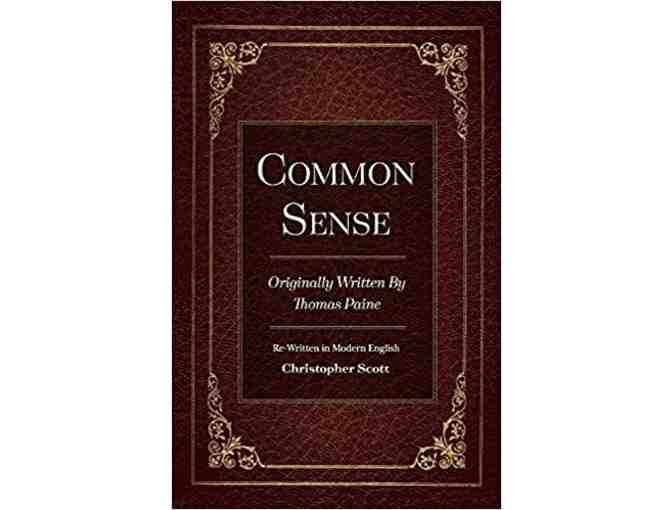Books
"Common Sense" by Thomas Paine! On CA's Recommended Reading List!
- Item Number
- 238
- Estimated Value
- 22 USD
- Sold
- 27 USD to ma3aa2488
- Number of Bids
- 5 - Bid History
Item Description
"How to read Common Sense by Thomas Paine without having to learn Old English as a second language. If you want to read Common Sense, this book is the easiest way to do it. Here's why, it's translated in modern English. Common Sense by Thomas Paine in a language you can understand. Free Shipping!
If you've ever tried to read it you know what I'm talking about. It was one of, if not the most influential books in American history. But it was written over 200 years ago and the old English it's written in, is nearly impossible to understand.
You have to read everything five times to make any sense of it, and even then,you're lucky if you understand it. There're words we don't use any more. The speaking style is basically backwards how we speak now, and the whole thing, is written in run on sentences. Try reading that. Try reading a book that completely turns up side down the way you would normally speak, with words sprinkled in that you don't know the meaning of, all written in sentences as long as a paragraph.
Why is Common Sense by Thomas Paine still important today? It was written over 200 years ago to address the issue of independence from Britain. Why is it still important in American government and politics today?
Thomas Paine wrote Common Sense before we we're even a country. At its core it was a call for independence from Britain, but it was also a book about freedom and the proper construction of government. It's a philosophical debate. Because of that, not everybody's going to understand or agree with it. But, it will expose the underlying problems that we see in politics today. To understand the relevance of Common Sense, it's critical to understand why it was so importantin the first place.
This is the translated book Common Sense by Thomas Paine, translated to modern English by Christopher Scott.
Common Sense in plain English.
Translated, carefully keeping the original meaning.
A book about principle.
The origin of government.
Logic and reason.
The world's most compelling call for freedom.
Thomas Paine brought back to life.
It's the strongest case for freedom ever made and a must read for anyone who wants to understand what freedom and government are supposed to be. Written in plain language everyone can understand it explains the natural relationship between government and people.
This is the best way to read Common Sense by Thomas Paine, because you'll be able to understand it and enjoy it."
"Paine arrived in America from England in 1774. A friend of Benjamin Franklin, he was a writer of poetry and tracts condemning the slave trade. In 1775, as hostilities between Britain and the colonies intensified, Paine wrote Common Sense to encourage the colonies to break the British exploitative hold and fight for independence. The little booklet of 50 pages was published January 10, 1776 and sold a half-million copies, approximately equal to 75 million copies today."
"Among the most influential authors and reformers of his age, Thomas Paine (1737–1809) was born in England but went on to play an important role in both the American and French Revolutions. In 1774, he emigrated to America where, for a time, he helped to edit the Pennsylvania Magazine. On January 10, 1776, he published his pamphletCommon Sense, a persuasive argument for the colonies' political and economic separation from Britain.
Common Sense cites the evils of monarchy, accuses the British government of inflicting economic and social injustices upon the colonies, and points to the absurdity of an island attempting to rule a continent. Credited by George Washington as having changed the minds of many of his countrymen, the document sold over 500,000 copies within a few months.
Today, Common Sense remains a landmark document in the struggle for freedom, distinguished not only by Paine's ideas but also by its clear and passionate presentation. Designed to ignite public opinion against autocratic rule, the pamphlet offered a careful balance between imagination and judgment, and appropriate language and expression to fit the subject. It immediately found a receptive audience, heartened Washington's despondent army, and foreshadowed much of the phrasing and substance of the Declaration of Independence.
A selection of the Common Core State Standards Initiative."
Constituting America stores data...
Your support matters, so Constituting America would like to use your information to keep in touch about things that may matter to you. If you choose to hear from Constituting America, we may contact you in the future about our ongoing efforts.
Your privacy is important to us, so Constituting America will keep your personal data secure and Constituting America will not use it for marketing communications which you have not agreed to receive. At any time, you may withdraw consent by emailing Privacy@frontstream.com or by contacting our Privacy Officer. Please see our Privacy Policy found here PrivacyPolicy.

